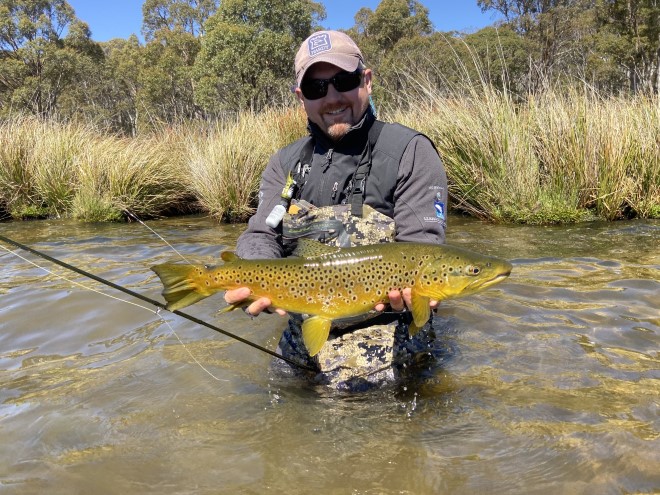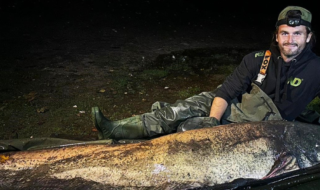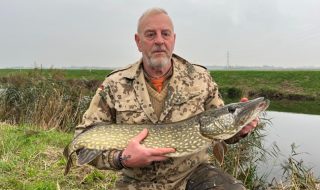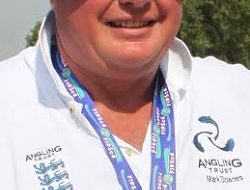Pic: New world champion Howard Croston with a magnificent brown trout from the 2019 world fly fishing championships in Tasmania.
AT-TEFF World Team Captain/Manager and newly crowned individual World Champion Howard Croston reports back on the 2019 World Fly Fishing Championships in Tasmania.
The team departed for Tasmania on Thursday 21st November for the long haul down to Tasmania – a small Island located off the coast of mainland Australia. The team consisting of Howard Croston (captain/manager), Lee Bartlett, Steve Cullen, Tony Baldwin, Mike Dixon and Bernie Maher (reserve/acting captain) arrived on Saturday 23rd November in Launceston to start the 2019 campaign.
Twenty-three countries, each with teams of five anglers competed for five days across five venues in gruelling conditions in the central highlands of Tasmania. Venues included both rivers and lakes where the target species were wild brown and rainbow trout. All the sessions were fished to full catch and release FIPS rules where scoring is based on the length of the eligible fish which are carefully measured and released. All fish over 20cms count towards the competition, with longer fish scoring more points. The winner of each section is placed first and receives one point, second two points etc. The ultimate winner is then the person with the lowest number of points after five days.
Practice Days
The team were provided with detailed information covering all the venues including maps of drifts, prevailing winds, recognised hot spots and general background information for each of the lake venues along with more general information for the river sectors. Practice venues were chosen on the basis of similar altitude and characteristics to the actual comp venues and not on the easiest “fishing” venues.
The team had two river practice days and three boat practice days to again mimic the competition format and only practiced hard during actual competition hours to try and gain a good perspective of the fishing in difficult and changeable conditions, with “lighter” general practice either side of match hours.
Despite boats being hard to come by Team England secured three boats for three days of practice, thanks to the incredible generosity from some top local anglers who went above and beyond in offering assistance and time to help out.
The team was based out of the IFS Station close to the great lake that was both comfortable and local to the practice venues with a large communal area for fly tying etc. This was kindly provided by the IFS and proved to be the best training camp England have enjoyed in many years with six single bed rooms, two shower rooms, a fully equipped kitchen, log burner and drying room!
Practice went well with everyone catching on a number of methods however certain flies and tactics proved more reliable than others – the team moved into the competition hotel on 30th November ready for the start on December 2nd.
Session One
England made a good start to the championships, ending the first session in fourth place with 38 placing points, behind the Czech Republic in first with 16 points. Finland were second with 29 points, and Slovakia third with 36 points. Howard Croston won his boat session on Penstock Lagoon with 11 fish, while Tony Baldwin finished sixth on Little Pine Lagoon, another boat sector, with four fish. Steve Cullen was twelfth on Woods Lake. On the river sectors Lee Bartlett finished ninth on the Meander River with Mike Dixon eleventh on the Mersey River.
Session Two
England built on their good start to end the second session in second place with 61 placing points, just one behind the Czech Republic on 60 points, and ahead of Australia and Slovakia. Mike Dixon won his boat session on Little Pine Lagoon with seven fish, with Tony Baldwin seventh on Penstock Lagoon and Lee Bartlett ninth on Woods Lake. This was backed by a second place for Steve Cullen on the Mersey River, and a fourth for Howard Croston on the Meander River, putting him third in the overall Individual placings, behind Jonathan Stagg (Australia) and Pavel Chyba (Czech Republic).
Session Three
As the competition sectors came under increasing pressure, England slipped to fifth place with 127 placing points, behind Spain fourth with 123 points, France with 119 points, the Czech Republic second with 116 points and Australia first with 115 points. Howard Croston came seventh on the boat sector Woods Lake and was now lying in fourth place in the overall individual placings. Elsewhere on the lake sectors, Mike Dixon came ninth on Penstock Lagoon, while Steve Cullen was one of nine who failed to catch on Little Pine Lagoon. On the rivers, Tony Baldwin came eighth on the Meander River with Lee Bartlett 20th on the Mersey River.
Session Four
Howard Croston continued his excellent captain’s performance with a second place on the Mersey River and was top in the current Individual rankings with 14 placing points, one ahead of Federico Santi Amantini (Italy) in second. Despite this, England slipped to 8th overall with 185 points, as France moved into first place with 146, with Spain second on 147, and Italy third on 161. Lee Bartlett avoided a blank on Little Pine Lagoon (where nine anglers blanked), as did Steve Cullen on Penstock Lagoon, while Mike Dixon came tenth on the Meander River, and Tony Baldwin 13th on Woods Lake.
Session Five
Howard Croston is the 2019 World Individual Champion! After a fifth place in his final session on Little Pine Lagoon he finished with 19 placing points, the same total as David Garcia (Spain) but secured the gold thanks to a higher fish points total, with Kristian Sveda (Slovakia) getting bronze with 22 points, ahead of Sebastien Delcor (France). On the other sectors Mike Dixon came fifth on Woods Lake, Lee Bartlett was ninth on Penstock Lagoon, with Tony Baldwin thirteenth on the Mersey River, and Steve Cullen sixteenth on the Meander River. In the team championships England hung on to eigth place, finishing with 233 placing points. It was close at the top. France were crowned the 2019 World Team Champions with 190 points, with the Czech Republic getting the silver with 191 points, and Spain winning the bronze with 192 points.
Close Contest in Tough Conditions
The conditions overall in the event were challenging to say the least with gale force winds affecting all of the venues and snow and heavy rain at times affecting the higher altitude lakes. This poor unseasonable weather affected the natural fly life and stalled some of the expected action on the hatch driven lakes to some degree levelling the field and removing much of the home teams’ advantage.
Team England as a whole fished well, and for a short while held on to second place overall before slowly slipping to the eventual finish place of eighth. World championships are always closely contested, and Tasmania was an incredibly close competition with the results swinging wildly based on a number of rapidly changing factors – including river beat draws and wild weather conditions continually changing the prospects on the lakes – often within the same session.
Congratulations are due to the ever-consistent teams that made the podium despite this year’s boat fishing bias that should have seen England perform better. Ultimately despite fishing well the very close nature of the competition saw a relatively new England Team struggle to maintain the consistency needed to make the podium despite some good consistent results from anglers including Mike Dixon’s solid top 20 finish. Howard finished with 41 fish, the longest fish at 50.2cms and 19 place points.
Howard Croston, World Team Captain and Manager and the 2019 World Champion said, “To compete against the best anglers in the world so far from home on unknown venues in some of the worse weather conditions imaginable was a very daunting task, however, the team practiced well and found solid methods that beat the conditions. To win a gold medal whilst captaining and managing my country was something, I never dreamed possible and, despite the conditions, the incredible fishing in Tasmania did not disappoint.”
Andy Taylor AT Competitions Support Officer said,“It’s been ten years since England last had an individual gold medal and Howard’s gold caps off a great performance in some tricky fishing conditions against the best anglers in the World. Howard has put in a considerable amount of time, hard work and effort over the years and to captain and manage a team over the other side of the World shows his commitment and desire to be competing at the highest level. To be World Champion and to lead a new team to eighth place in this year’s championships is a huge achievement and I know that he will bring even further success in Finland next year.”






